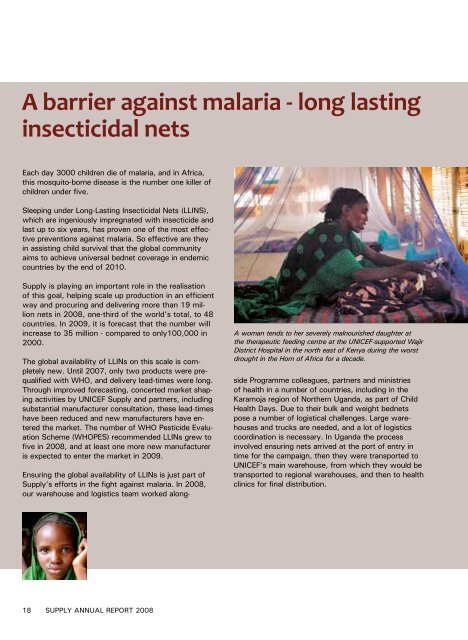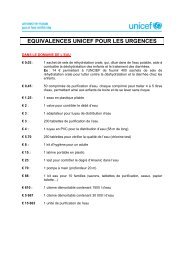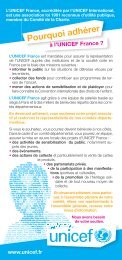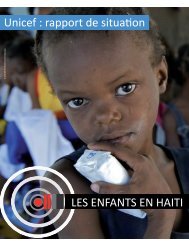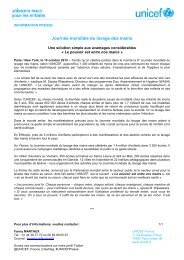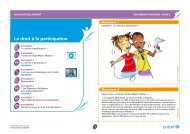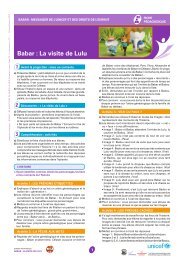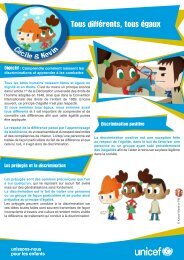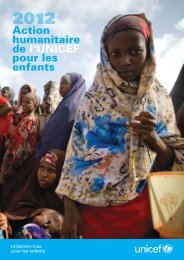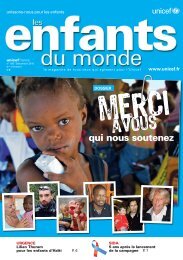SUPPLY ANNUAL REPORT 2008 Local Delivery Global ... - Unicef
SUPPLY ANNUAL REPORT 2008 Local Delivery Global ... - Unicef
SUPPLY ANNUAL REPORT 2008 Local Delivery Global ... - Unicef
You also want an ePaper? Increase the reach of your titles
YUMPU automatically turns print PDFs into web optimized ePapers that Google loves.
A barrier against malaria - long lasting<br />
insecticidal nets<br />
Each day 3000 children die of malaria, and in Africa,<br />
this mosquito-borne disease is the number one killer of<br />
children under five.<br />
Sleeping under Long-Lasting Insecticidal Nets (LLINS),<br />
which are ingeniously impregnated with insecticide and<br />
last up to six years, has proven one of the most effective<br />
preventions against malaria. So effective are they<br />
in assisting child survival that the global community<br />
aims to achieve universal bednet coverage in endemic<br />
countries by the end of 2010.<br />
Supply is playing an important role in the realisation<br />
of this goal, helping scale up production in an efficient<br />
way and procuring and delivering more than 19 million<br />
nets in <strong>2008</strong>, one-third of the world’s total, to 48<br />
countries. In 2009, it is forecast that the number will<br />
increase to 35 million - compared to only100,000 in<br />
2000.<br />
The global availability of LLINs on this scale is completely<br />
new. Until 2007, only two products were prequalified<br />
with WHO, and delivery lead-times were long.<br />
Through improved forecasting, concerted market shaping<br />
activities by UNICEF Supply and partners, including<br />
substantial manufacturer consultation, these lead-times<br />
have been reduced and new manufacturers have entered<br />
the market. The number of WHO Pesticide Evaluation<br />
Scheme (WHOPES) recommended LLINs grew to<br />
five in <strong>2008</strong>, and at least one more new manufacturer<br />
is expected to enter the market in 2009.<br />
A woman tends to her severely malnourished daughter at<br />
the therapeutic feeding centre at the UNICEF-supported Wajir<br />
District Hospital in the north east of Kenya during the worst<br />
drought in the Horn of Africa for a decade.<br />
Ensuring the global availability of LLINs is just part of<br />
Supply’s efforts in the fight against malaria. In <strong>2008</strong>,<br />
our warehouse and logistics team worked alongside<br />
Programme colleagues, partners and ministries<br />
of health in a number of countries, including in the<br />
Karamoja region of Northern Uganda, as part of Child<br />
Health Days. Due to their bulk and weight bednets<br />
pose a number of logistical challenges. Large warehouses<br />
and trucks are needed, and a lot of logistics<br />
coordination is necessary. In Uganda the process<br />
involved ensuring nets arrived at the port of entry in<br />
time for the campaign, then they were transported to<br />
UNICEF’s main warehouse, from which they would be<br />
transported to regional warehouses, and then to health<br />
clinics for final distribution.<br />
18 <strong>SUPPLY</strong> <strong>ANNUAL</strong> <strong>REPORT</strong> <strong>2008</strong>


